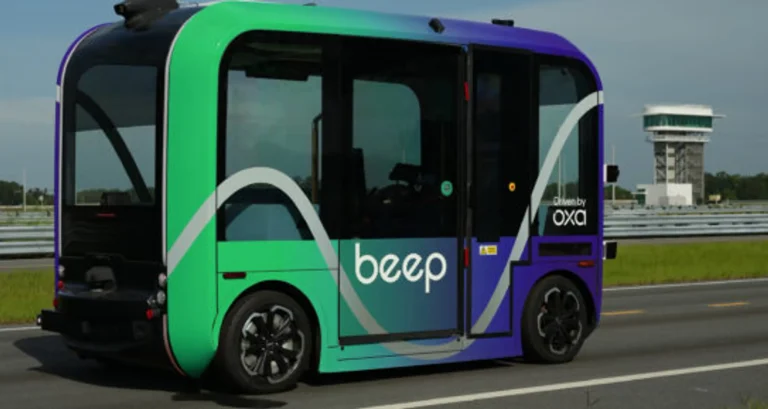The Jacksonville Transportation Authority (JTA) and Florida State College at Jacksonville (FSCJ) have launched an autonomous shuttle service on FSCJ’s campus. FSCJ is reportedly the first college campus in Florida to receive autonomous shuttles for students and visitors.
In 2020, JTA and FSCJ executed a joint memorandum of understanding to explore ways to educate and transport students and improve roadway and pedestrian safety through enhanced mobility options in the City of Jacksonville.
The shuttles are operated by Beep, a Florida-based provider of autonomous shared mobility solutions, and incorporate self-driving software from Oxa, an AV software company. The aim is for the AVs to connect students, faculty and visitors across the segmented FSCJ Downtown Campus on a one-mile route that connects the Advanced Technology Center with Buildings A, B, C and D.
The electric and autonomous platforms build upon previous testing and validation done by JTA at the FSCJ Cecil Center Campus test and learn track, and at the Armsdale Test and Learn Facility. The facilities are purposed for evaluating autonomous technologies ahead of Phase 1 of the U2C, the Bay Street Innovation Corridor, in 2025.
JTA CEO Nat Ford said, “This initiative is a testament to years of hard work and collaboration between the private and public sector, including the US Department of Transportation. We are eager for the FSCJ campus and the wider Jacksonville community to experience these AVs firsthand to see the benefits these vehicles bring as we prepare for the launch of Phase 1 of the U2C program, the Bay Street Innovation Corridor, in 2025.”
The first phase of the U2C program will implement a full-scale autonomous shuttle network with connected technology down Bay Street in 2025. The program comprises three main phases to build the 10-mile transportation network connecting key downtown Jacksonville corridors and aims to provide mobility for all by extending access to goods, services, entertainment and jobs.
“The project at FSCJ, Beep’s third university campus deployment, marks the beginning of our collective efforts with our partners in the JTA U2C project to transform mobility and accessibility while improving roadway safety and reducing carbon emissions in the City of Jacksonville,” said Beep CEO Joe Moye.
“Community feedback and practical experience from these pilots is vital for the safe advancement of autonomous technology, which deepens our industry’s understanding of what is required to improve the development and deployment of these technologies to change how people move and connect to key services within our communities”, he added.
For more on autonomous shuttles, click here.


